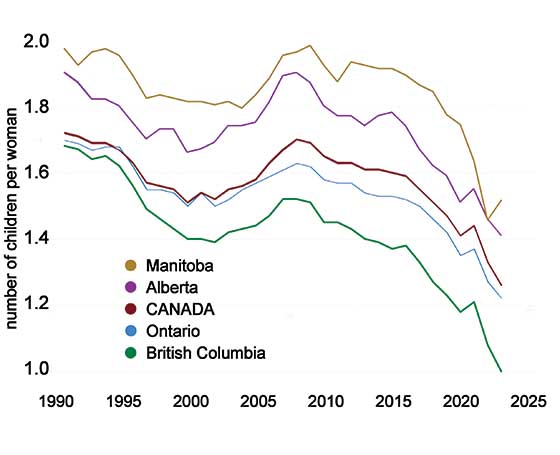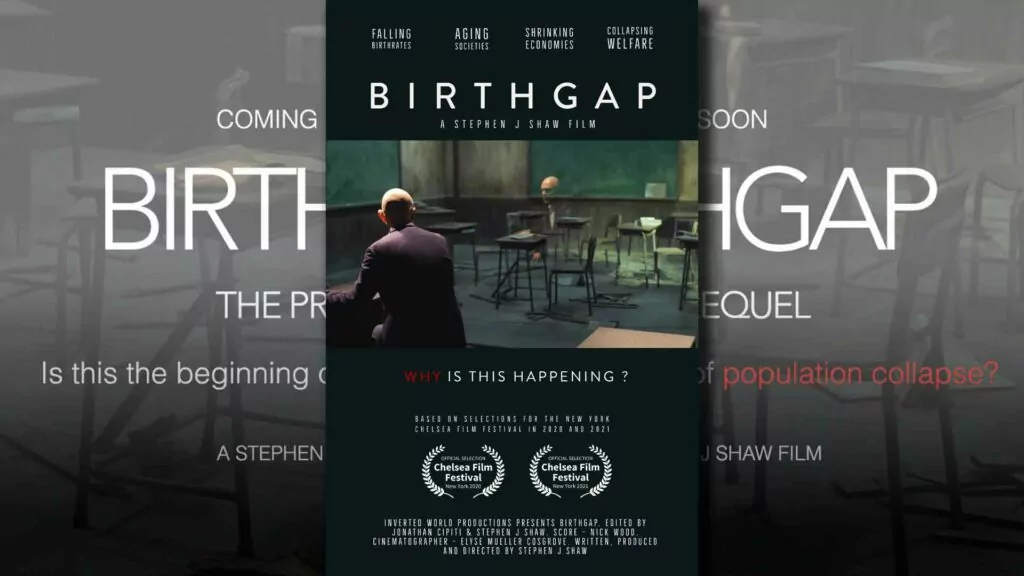Birthgap – Childless World
Documentary
2021 / 51 minutes
Rating: 9/10
Birthgap dismantles one of the biggest, deadliest lies of our time: the "myth" of overpopulation.
It's a big lie in how many believed it – the whole world! – and big too in how absolutely backward it got everything. The impact was absolutely murderous, justifying abortions by the millions in the name of saving the planet from the burden of having too many mouths to feed.
But overpopulation was a danger that never existed. Christians didn't always, but should always, have known better. We need only contrast what God says about children – how they are a blessing (Ps. 127:3-5, Prov. 17:6, Deut. 7:13-14, and of course, Gen. 1:28) – with how the overpopulation proponents were presenting them as a curse. We could also have known from the fruit of this movement – when killing babies is the solution, then there must be a problem with the problem.
This is, however, a secular documentary, so the producer is limited to looking at just the data and at history. He begins his story with Dr. Paul Ehrlich, who was and remains the biggest of the overpopulation fearmongers, and whose 1968 book The Population Bomb began with this stark prediction:
"The battle to feed all of humanity is over. In the 1970s hundreds of millions of people will starve to death in spite of any crash programs embarked upon now. At this late date nothing can prevent a substantial increase in the world death rate..."
That his short-term predictions didn't happen didn't stop the fear from spreading (and hasn't stopped Ehrlich from remaining a popular "expert" even today). In 1979 China implemented their ruthless One-Child Policy, permitting couples to have just one child. For the next two decades a generation was raised that had no siblings. And the generation that followed had not only no siblings, but no aunts, uncles, or cousins. Here in Canada, where most of us have been blessed with at least some extended family, we know better than the Chinese themselves the magnitude of the joy that was stolen from them. And speaking practically, a Chinese couple could find themselves with two sets of aging parents and perhaps four sets of aging grandparents to care for, with no siblings or cousins to help them. Who will step in? The government?
In the rest of the world, family size has shrunk too, less dramatically, but relentlessly. Dr. Ehrlich and his disciples have people living in fear of the sort of barren, depleted planet the next generation would inherit. Who would want to bring children into a world of certain starvation, wars, and so much death?
The real danger
But as Birthgap unpacks, the real danger lies in the other direction. The world has stopped having children and many countries soon won't have enough people in the workforce to be able to support their aging population. This film is named after a statistic that narrator and producer Stephen J. Shaw identified:
"If we look at Italy... in 2019, there were around one million people aged 50 who will be retiring in around 20 years time. Then, if we look at the number of newborns, who, in around 20 years time will be entering the workforce to support these retirees, there are less than half! Any large gap between the number of newborns and the number of people they will have to support into retirement is significant, socially and economically. Given that these gaps are being caused by long-term low birthrates, I decided to call any shortfall in workers 'birthgaps.'”
This birthgap shortfall – the greater number of 50-year-olds as compared to newborns – exists in almost every country in the world outside of Africa. And the gap is growing. The US has one of the smallest birthgaps of just 14%, with 3.6 million newborns in 2020, compared to 4.1 million who are 50. In contrast, South Korea has among the worst birthgaps, at 71%, with 263,000 babies born in 2021, to replace the 903,000 50-year-olds.
Another way to look at this is by birthrates: how many children are born per woman. To replace the previous generation and keep the population stable (neither growing nor shrinking) we would need each woman to have 2 children – one to replace her, and the other to replace her spouse. But, as Shaw explains, we're nowhere near 2. "Japan, Italy, and Germany, with birthrates around 1.4 children per woman..." will in just two generations see their population "fall by over half, and in three generations, by 70%."
Doing better than the one-eyed man
This is a secular film, which means that Shaw, as insightful as he is and eager to figure out why this is happening, can't answer his own question. He doesn't understand the spiritual battle that is occurring behind the scenes.
But God has revealed it to us. He commanded that we be fruitful and multiply and fill the earth... (Gen. 1:28) so, of course, the Devil whispered – and with the help of Dr. Ehrlich, shouted – that children were a curse on the planet, and each baby just one more mouth to feed. But as even this film presents, we are creators too. "Many hands make light work," isn't a biblical proverb, but "Two are better than one, because they have a good return for their labor” is (Eccl. 4:9). We can't create something out of nothing like God, but our brainpower can create resources out of materials that once weren't resources at all (my favorite example is how farmers turned their excessive supply of manure into bedding for their cows). Many brains did that. What a blessing it would be if we had more of them to solve more such problems!
So why is the population declining so dramatically? Because God said, "have no other gods" (Ex. 20:3) and the world has turned from Him to worship the gods of comfort, career, recreation, travel, and more. A child can bring so much joy, but a boy or girl will also require your time, your sleep, and your money. And in interview after interview, Shaw finds people who are waiting to have things just so before they get down to having a child. But that path leads to them just not having kids at all. That unintended result might be what the Church most has to watch out for. God's people aren't going to flat-out reject His call on married couples to be fruitful but it is easy to justify delaying. And one small delay after another can add up to the same unintended result the world is seeing, with either far fewer kids than we might have thought we were going to have, or no children at all. God doesn't give us a prescribed family size, so couples will have to consider for themselves what it will mean to obey that command ...but let's not casually delay our obedience.
Meanwhile, the world doesn't feel any push to obey God. And so they follow after their other gods... even though the interviewees seem to already understand that these gods won't ultimately satisfy.
Cautions
A pair of men are among the couples Shaw questions about having kids. They are on screen for a few seconds.
Conclusion
Stephen Shaw plans two sequels to this film where he will continue to seek an answer to his why question. But the answer Shaw is after – getting families to multiply once again – doesn't seem likely, outside of revival. So, this is a great film to make you and whoever you might share it with, aware of an enormous problem the world faces. But only God's people know the solution. And with that special knowledge comes a special obligation to share it because to whom much has been given, much will be required (Luke 12:42).
We can point the way out of this whole mess. Repent and believe. Trust what God says about children. Obey His command to multiply. Share both the good news of the Gospel, and share the wisdom of our Heavenly Father Who knows what is best for us when it comes to procreation... and everything else.
Watch the documentary for free below (it is called Part 1 but is complete in itself). I'd nominate this one as a must-see in our schools and homes. Birthgap really deserves an hour of your time!
...
 So how might this impact Canada’s population over the coming decades?
So how might this impact Canada’s population over the coming decades?











